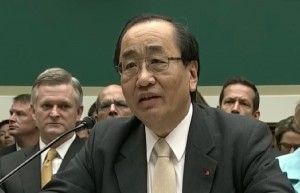
Takata's Hiroshi Shimizu told the House Energy and Commerce subcommittee today the supplier would not expand the recall of its airbags nationwide.
During a Congressional hearing today, Takata Corp. clung to its assertion that there is no need for a national recall of its faulty airbags and said it would not accede to the wishes of federal safety regulators demanding the action. Moments later, a Honda executive told lawmakers the automaker would expand its regional action to a national recall despite Takata’s refusal.
The Japanese supplier also stated that the National Highway Traffic Safety Administration lacked the authority to compel the supplier to institute any sort of recall. NHTSA disagreed with the claim.
At issue is are airbag’s inflators that may explode with too much force, spewing plastic and metal shrapnel into the vehicle cabin. At least five deaths and dozens of injuries have been linked to the problem worldwide. The current regional recall affects 7.8 million vehicles.
Hiroshi Shimizu, senior vice president of global quality assurance at Takata, told the House Energy and Commerce subcommittee during the hearing that the available data and scientific evidence on the airbags “doesn’t support” a nationwide recall.
However, during the same hearing,
Honda Executive Vice President Rick Schostek said the automaker would comply with NHTSA’s demands. Honda is Takata’s biggest customer and its vehicles account for 5 million of the 7.8 million recalled vehicles. Later in the day, Chrysler agreed to expand the recall to include more high-humidity states, although it did not take it to a national level.
On Nov. 26, NHTSA issued a letter to Takata and several automakers demanding they broaden a recall of driver’s side airbags to all 50 states. It gave the supplier until Dec. 2 to respond to the request or face further action by the agency. Those actions could include a $7,000 fine for every vehicle with a faulty airbag. The maximum amount NHTSA can fine a company is currently $35 million.
Takata’s refusal to comply with the demand means the agency may have to go to court to enforce the order. David Friedman, NHTSA’s deputy administrator, said the agency is contemplating its next move.
(NHTSA debates how far to expand Takata recall. For more, Click Here.)
The supplier said expanding the recall is not only unnecessary, but would divert the replacement parts away from the areas of the country where they are needed. If expanded, it would double the number of vehicles needing replacements to 16 million.
Despite expanding production of the replacements, the supplier can only produce 450,000 units each month and it won’t reach that level until early next year. NHTSA suggested last month that Takata enlist the assistance of other manufacturers to speed the production of the needed replacements.
(Click Here for details about why cars are safer than ever in spite of the recalls.)
As part of its plan to expand its recall, Honda forged a deal with Autoliv to produce the new parts. In order to be able to meet increased demand, the supplier will build additional inflator capacity in its existing manufacturing facilities. Deliveries are estimated to begin in six months.
(To see more about why BMW isn’t partnering up with Tesla, Click Here.)
While Takata declined to expand the recall, Shimizu said it was taking additional steps to ensure the replacements are up to snuff. The process will be audited by three former U.S. Transportation Secretaries – Sam Skinner, who led the Transportation Department under President George H.W. Bush; Rodney Slater, who held the post under President Bill Clinton; and Norman Mineta, who served in the Clinton and George W. Bush administrations – to ensure it’s meeting requirements. The three will also be expected to lend expertise in other areas, such as testing and reporting, during their tenure.
Additionally, Takata is teaming with automakers to expedite testing on airbags from outside the affected four-state region to determine if there are problems with those devices.
